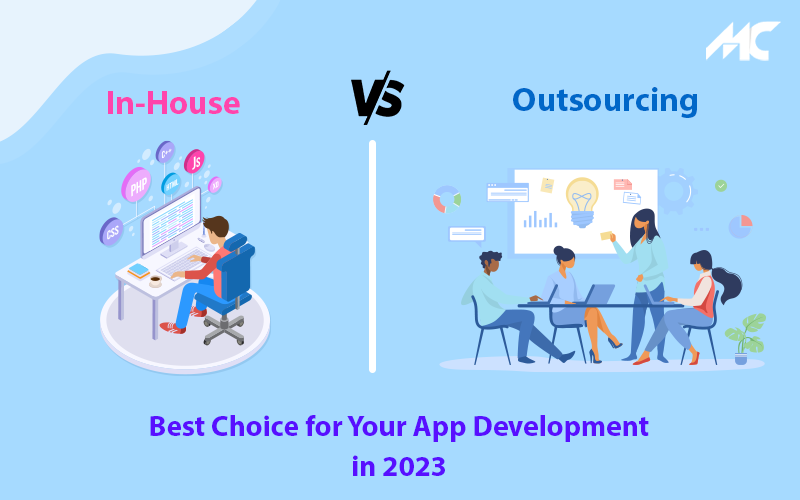When it comes to developing mobile apps, app owners mostly have two options-either hire in-house team or outsource the project. And which method suits you best is certainly not an easy way to choose. As mobile app development industry is expanding, the methodologies of creating apps are also changing.
If you are also pondering on choosing the best method to build your mobile app. Then, here we will give you a quick comparison between in-house vs outsourcing to help you decide which is the best approach for your app development in 2023.
So let’s get started
But at first
What Is Meant By In-House Application Development?
In-house application or software development is a method where you set up or recruit your own development team at your workplace. In this method, you onboard employees, hire dedicated developers and set up all the required resources.
It requires great effort since you have to manage everything right from the beginning. You have to go through the hiring and onboarding process which consumes considerable time, effort, and cost.
What Is Outsourcing?
Outsourcing means delegating or hand-over any project to a third-party service provider. In the outsourcing process, you don’t own a developer team. Instead of this, you hand over the application development project to a dedicated mobile app development company.
This third-party vendor takes full responsibility for your app development project. They have their own in-house team of dedicated developers, UI/UX designers, project managers, QA, and other required professionals.
Advantages Of In-House Development
Though, at first instance, the in-house development process may appear as a time and effort-taking task. But it gives unique benefits for developing mobile apps.
1. Security
Mobile app development is a complex process that involves significant resources and sensitive data. For many companies and app owners, data security and confidentiality matter the most. Therefore, they opt for an in-house development approach since it gives them total control over the entire development process.
They hold complete rights and authority over the developers. As a result, it allows them to secure all the data and other resources kept under control and fully secure. App owners can use the technology of their own choice that meets the latest standards.
2. Full Team Control
It is one of the top benefits of why businesses go with an in-house app development approach. This application development method gives full control over the team. Since the app owner or company recruited the team they don’t have to depend on third-party approval or negotiation to work with a developer. With an in-house team at the workplace, things become much easier and faster as any time you can work with any member of the team.
3. Great Flexibility
When you own an in-house development team, it gives you much better flexibility to make changes to the app. You can add new features, fix technical issues, or make any appropriate changes anytime. As you have full control over the team, you won’t need to negotiate with a third-party vendor to implement the changes.
Disadvantages of In-House Development
In-house development process is apparently a time and effort-consuming process. Since it involves everything from scratch so it comes with some advantages as well. Here are those
1. High-Cost
This is the biggest drawback of working with an in-house application development approach. You have to set up a full-stack team and give your complete time in handling the team and other resources. Besides this, the cost of hiring developers is also expensive.
In the USA, to hire Android app developer might charge you between $100-$150. So depending on the number of your developers, the cost of hiring will also increase. This, as a result, impacts the cost of mobile app development significantly.
2. Time-Consuming
In-house app development involves great effort and time. It demands consistent monitoring and management to handle developers, designers, QAs, and other rest of things. Hence, app owners have to invest a lot of time and effort into the development process. So they lose their productive time which could have been utilized in the productive areas.
Advantages of Outsourcing
In the current mobile app development industry, outsourcing is widely preferred by businesses due to the impressive benefits that it offers.
1. Affordable Cost
Outsourcing means you simply give your project to a third-party service provider or a mobile app development company. Consequently, you don’t need to manage anything related to development. You just need to constantly communicate with them to monitor the development progress. Outsourcing eliminates the need for recruiting an in-house team at the place. As a result, it reduces the cost of app development drastically.
2. Wider Access To Talented Pool
Outsourcing gives you wider access to choose the best pool of talented professionals. With the massive growth in app development, the number of mobile app development companies has also increased a lot. You can hire mobile app developers or a dedicated company in most countries across the globe. So, you get a broad opportunity to select the best developers for your mobile app project.
3. Top-Quality Solutions
The success of a mobile app largely depends on how well it performs and what exciting features it has to offer. And if you are a non-technical person, things get even more challenging since you don’t have an idea of the latest trends and technologies to be used for mobile app development.
In this case, outsourcing allows you to build your app with the help of a professional company that uses state-of-the-art technologies. They have qualified developers and high-end tech resources. So, it enables you to get top-quality solutions and ensure your success in the industry.
Disadvantages of Outsourcing
Despite the exciting advantages outsourcing provides, it also has some limitations and a few drawbacks which are important to consider.
1. Lack of Control Over the Team
In outsourcing development, you don’t get full control over the mobile app development team. The third-party service provider or the company that you have hired holds complete control of their team.
You have to negotiate or discuss with the outsourcing company to work directly in coordination with the developers. However, it doesn’t mean you won’t get any updates about the status of the project. The project management team will keep you in the communication channel for all updates.
2. Security and Trust
Since you hand over all the information related to your project to a third-party developer, it involves great security concerns. You have to find a trustworthy company that follows up-to-date practices to ensure data security. You need to sign an NDA and ensure the company ensures all the compliances and regulations.
So which is the best between in-house vs outsourcing development?
By considering all aspects, it is evident that outsourcing stands out as the best method for mobile app development. And the reasons are obvious. Outsourcing allows businesses to build high-quality mobile apps while saving huge cost, time, and effort. This empowers business people to take maximum advantage of mobile apps and achieve better success.
Conclusion
Mobile app development is not so easy process. It requires great technical expertise and the right use of technologies to build a successful mobile app. Therefore, it is important to choose the appropriate method for app development.
As competition continues to grow in 2023, the best way is here to outsource the project to a reliable mobile app development company. They will help you develop a feature-powered mobile app that will bring success to your business.















































